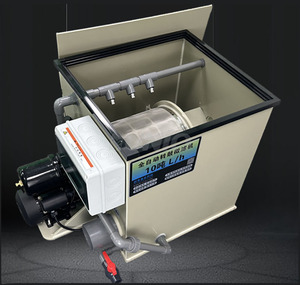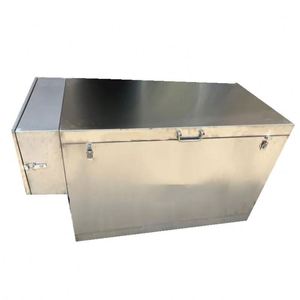(3586 products available)





















































































































































































Koi ponds have become extremely popular in recent years due to their beauty and perceived value, which has led to an increased interest in koi fish. Koi enthusiasts know that koi water filters are essential for maintaining koi ponds. By filtering out harmful substances, these filters help keep the kois healthy and happy.
Finding an ideal koi water filter can be difficult because many options exist. The most basic koi pond filters work mechanically by trapping debris, while others may also remove chemicals with additional features.
The type of koi water filter used depends on several factors, such as the size and number of fish in the pond, as well as its surface area and depth. Different models cater to specific needs, making it easier to choose one that best suits any particular situation. Here are the different types of koi water filters available:
Koi pond filters are designed to handle and clean large volumes of water while ensuring the safety and well-being of koi fish. Here are some key features and functions of koi water filters.
Ammonia Removal
Koi fish tend to produce high levels of ammonia during spawning, which can be toxic to them. Koi water filters come equipped with sponge foams that filter out ammonia and other toxic chemicals to keep the fish healthy.
Particulate Filtration
Koi pond water filters remove suspended solid particles, including dirt, algae, and plant debris, from the water column through mechanical filtration and provide crystal clear water for the fish.
Nitrogen Cycle
Every koi water filter uses nitrogen cycle bacteria to break down and convert ammonia produced by koi fish into less harmful substances. This helps in maintaining a stable biological filter essential for koi fish health.
UV Sterilization
Koi fish filters UV sterilization technology with an ultraviolet lamp that produces UV-C light to kill harmful bacteria, viruses, parasites, and pathogens in the water and improve the fish's immune system. It can also prevent the outbreak of diseases and reduce the need for antibiotics.
Heavy-Duty Construction
Koi fish filters are built to withstand outdoor conditions for a long time without breaking. They are constructed using durable and weather-resistant materials such as cutting board materials, PVC, and stainless steel to ensure long-lasting performance.
Easy Maintenance
Most koi pond filters have user-friendly designs that allow them to be cleaned easily and regularly to remove sludge and accumulated debris. Simple maintenance routines will ensure that the koi pond filter works effectively for many years.
Multi-Stage Filtration
Koi water filters use different filtration media to provide comprehensive water treatment and keep koi fish healthy. They have different filter media such as foam pads, Activated carbon filters, and poly mesh to improve the quality of koi fish water.
The water filters for koi ponds serve a few different purposes. One major one is to keep the water clean and free from any harmful bacteria or parasites that could potentially cause disease or harm the fish. It's just as important to provide them with a healthy habitat as it is to keep them healthy and safe. With proper filtration systems in place, owners can ensure their pets live long lives while enjoying themselves.
Koi fish are majestic creatures that can weigh up to 90 pounds. Because of their size, they require much larger koi filters. The size of the filter depends on the pond size and the number of fish it supports. These filters are designed to handle the high flow rates needed to keep the water quality up to standard for koi fish.
The koi water filter plays a vital role in koi pond maintenance. It helps keep the water clean and safe for these beautiful creatures. By filtering out harmful substances and providing good-quality water conditions, koi owners can ensure their fish live long, healthy lives. When shopping for koi pond filters, it's always a good idea to work with a reputable supplier. One needs to make sure they have all the required components for proper filtration system and that it meets the specific needs of your koi pond. With just a little brand research, one will be on their way to providing a home where koi can thrive.
Whether at home or in professional settings, koi pond water filters are used to keep the water clean and clear. Filtered water provides a better habitat for koi and allows them to thrive. The following uses of koi water filters describe more about their importance:
A few factors must be considered when selecting a Koi pond water filter that serves a specific need. These are the pond size, flow rate, filter type, and specific filtration needs, as well as ease of maintenance and operation.
The size of the pond is the first factor to be looked at. This determines the water filter system's capacity and size. Larger ponds require bigger-filtering capacities to adequately take care of the water. The koi pond filter chosen should be one that can handle the volume of water in the koi pond. This is crucial since the koi fish pond water filter should turn over at least once every hour. This means that the gallons of water in the pond should be filtered through the koi water filter every hour. In larger ponds, this number will be higher, depending on the size of the pond. For example, a 2000-gallon pond will require a filter that can handle 2000 gallons per hour, while a 3000-gallon pond will require one that can handle 3000 gallons per hour.
The flow rate of the koi pond water filter is another specification that must be seen to, as it is vital for the efficient functioning of the filter. The filter's turnover rate, or how quickly it can circulate pond water, is determined by the flow rate. For a koi pond, finding the right balance in the flow rate is important—not too low or too high—to ensure effective filtration without stressing the fish.
The filter type must also be determined, as different kinds of filters have varied capabilities. Some may help reduce suspended particles in the water, while others may improve the filter's capacity by adding extra biological filtration.
Knowing the specific filtering needs of the koi pond is critical, as the correct koi water filter can help maintain the pond. The koi fish load—the number and size of koi fish present—has a big influence on what kind of filter should be chosen. A larger number of koi will require a more efficient filtering system, while a lesser number will do just fine with a standard filter. Other factors to consider in the specific filtering needs are the pond's plant life and the filtration system's ability to eliminate toxins, particulates, and harmful bacteria.
Finally, a koi water filter that is simple to maintain and operate is important. Regular cleaning and filter media replacement are known to require special care and attention. Choosing a filter with user-friendly features and good support is recommended, as such koi pond filters can help reduce the time spent on pond maintenance.
Q1. How often should a koi water filter be cleaned?
A1. The koi filter must be regularly maintained to ensure it works effectively. Cleaning frequency depends on different factors such as filter type, koi pond size, and fish load. As a general guideline, the koi filter cartridges should be cleaned at least once every two weeks.
Q2. How long do koi water filters last?
A2. With proper maintenance and regular upkeep, many koi water filters can last for decades. It is essential to periodically check and replace any components that may wear out over time, such as pump seals or impellers.
Q3. Do koi fish need a filter?
A3. Koi fish undoubtedly need a filter. Koi are hardy and active fish species that produce a relatively large amount of waste. Without a filter, it is impossible to maintain adequate water quality for koi. Most koi water filters are designed to handle the specific needs of koi ponds.
Q4. How many times should water go through the filter in a koi pond?
A4. Ideally, the water in the koi pond should pass through the filter at least once every hour. However, this may vary depending on pond size, filter capacity, and fish load.